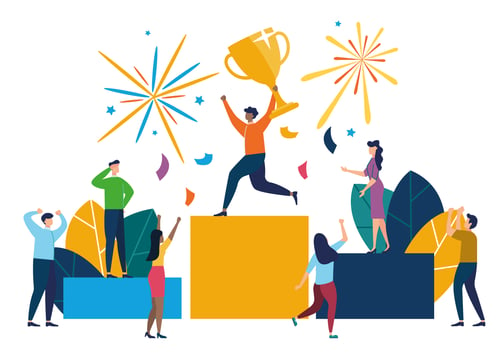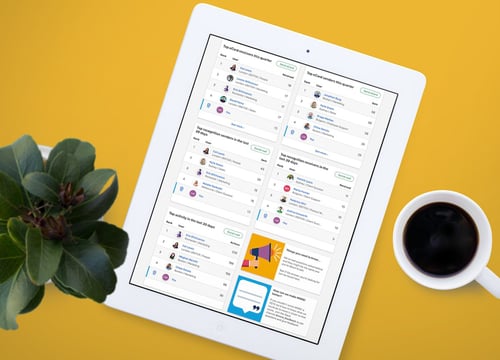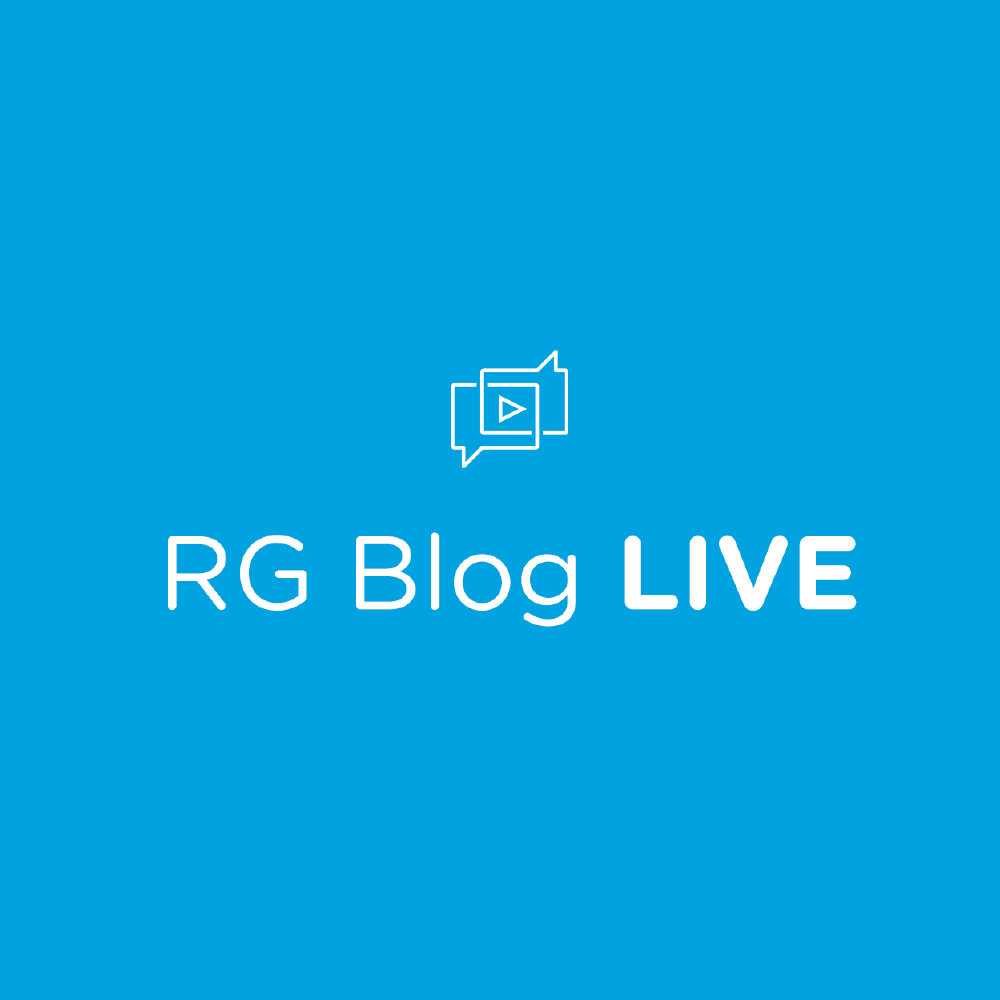6 min read
Welcome back to RG Blog Live! After our first two episodes, we took a pause so that we could focus on helping you to support your employees and businesses through the pandemic. Now we are back with our third and final segment featuring Craig Tanner, our Senior Product Manager at Reward Gateway.
In our first two segments, I spoke with Craig about our Product Manifesto and the evolution of reward and recognition. For those of you that may have missed the first couple installments of this, we got a lot of questions here about our product, the direction, why we do what we do. I wanted to go straight to the source, so a few months ago I sat down with Craig to gain more insight.
Take a peek at the third talk below on “RG Blog Live” where Craig and I take a deeper look into gamification and employee recognition.
Chloe Deiulis: One of the topics that comes up a lot is gamification. I wanted to get your thoughts around that. Let's start out with a basic. What is gamification?
Craig Tanner: I actually prefer not to call it gamification – I prefer to call it “engagement elements,” because that's the behavior that we're driving and that's what the outcome is. People use “gamification,” but it's not necessarily games. That's one of the big misconceptions out there, that “we're turning the system into a game." It's not true. We're using gamification elements, which includes badges, leaderboards, levels, stuff like that, to try to drive or incentivize certain behaviors.

CD: When we're talking about gamification or engagement, when is a good time to gamify versus not?
CT: Yes, you want to make sure that if you're implementing gamification elements, you're incentivizing the right behaviors. I've seen folks just say, "Oh, we're going to throw so much gamification out there." I mean, if it's now detracting from the core message or the core activities, we're probably doing it incorrectly, right? I've seen too much gamification at times.
Download our eBook to learn how gamification in employee recognition can improve engagement »
The best way to do it is to ask yourself, "What are the core behaviors we're trying to exhibit or see in the application that is being underserved?" That's when we want to say, "OK, let's tie that to a badge or we'll give employees some points for doing those behaviors."
Some of the best gamification I've seen is through onboarding activities. You've got this checklist when you go in – complete your profile, upload a photo, etc. – and you get a status bar of completion. We're used to status bars – people don't realize that's a gamification element. We're showing progress as we try to make progress towards a central goal.
CD: When we're talking about gamification on, say, a reward or recognition platform, when is a good time to use it?
CT: One of the things I love to see in recognition programs is something like badges or leaderboards. Some of the more successful leaderboards I've seen are around sent recognition behavior or activity. A lot of recognition platforms, including ours, have a social feed where you can go and you can see all the recognition, and we encourage people to go like and comment on other people's recognition on the “Wow Wall,” which encourages peer-to-peer recognition.
I want to incentivize that behavior by showing a leaderboard – how active you are in comments and likes and how many eCards you’ve sent. Having clarity around this “who's leading the pack,” and we could have those reset every 30 days, or have a best sender for the year. There is some flexibility on the timeframe, but those are the behaviors we want to drive and leaderboards have really been successful in that space.

CD: From an HR administrative professional viewpoint versus what an employee might think, why do they care about gamification?
CT: At a really high macro level, you're trying to drive certain behaviors – you want to make sure that if you're paying for a software like recognition, you're actually making a difference. You want people to log in frequently. You want people sending those recognitions, so it's driving the success of your employee recognition program.
Gamification is one lever. It's not the only lever or the most important lever, but it's one lever that you can pull to try to drive engagement in your application or in your recognition program that you've implemented. That's at the macro or admin level.
When you go down to a user level, it’s interesting to see the data that shows that people are more incentivized by earning a badge or a status than they are by monetary or other tangible rewards. That's what's really cool about the end-user is that they love seeing themselves on top of those leaderboards.
It taps into that psychology of some healthy, friendly competition – similar to selecting an employee of the month. Employee of the month is a non-software-driven gamification element to say, "Hey, let's try to encourage all of the employees, but we're going to give one badge" It's the same thing when we talk about software.

CD: Ah, interesting. I never thought about it that way – about digitizing employee of the month through your technology. How should HR think about gamification when they're going out to choose a reward and recognition app provider?
CT: That's a good question. First, I'd say don't be afraid of it – it’s being implemented, it’s becoming more common – educate yourself a little bit and know what you’re hoping to achieve. Know the behaviors, but most importantly, know that gamification on a bad recognition program is still a bad recognition program.
We want to make sure that we have the core fundamentals of the recognition platform or the software correct. If the flow of sending and receiving eCards isn't engaging in itself and if that employee (when they receive the nomination or eCard) isn't excited about that, throwing a badge or putting a leaderboard on top of that still isn't going to do anything.
And so yes, gamification is probably one of the checkpoints you're going to look at when you're going in and looking for a vendor to provide software. But it's only one piece of a larger puzzle, which is:
- Is this the right strategic partner for me?
- Are they going to drive engagement in my workforce?
- Do they have quality data that I can go and learn from as an admin if I don't quite know what to do?
- Am I partnered with a client success team that I can go to for help with best practices?
Those are all good questions as well, in addition to making sure that we've got cool gamification to keep people engaged.
CD: Yes, and now people are just going to keep using it and keep coming back for more.
CT: Absolutely.
CD: Cool. Well, thank you so much for joining me yet again, Craig. I really appreciate it and I'm looking forward to the next time. Bye, everyone.

 Chloe Thompson
Chloe Thompson



